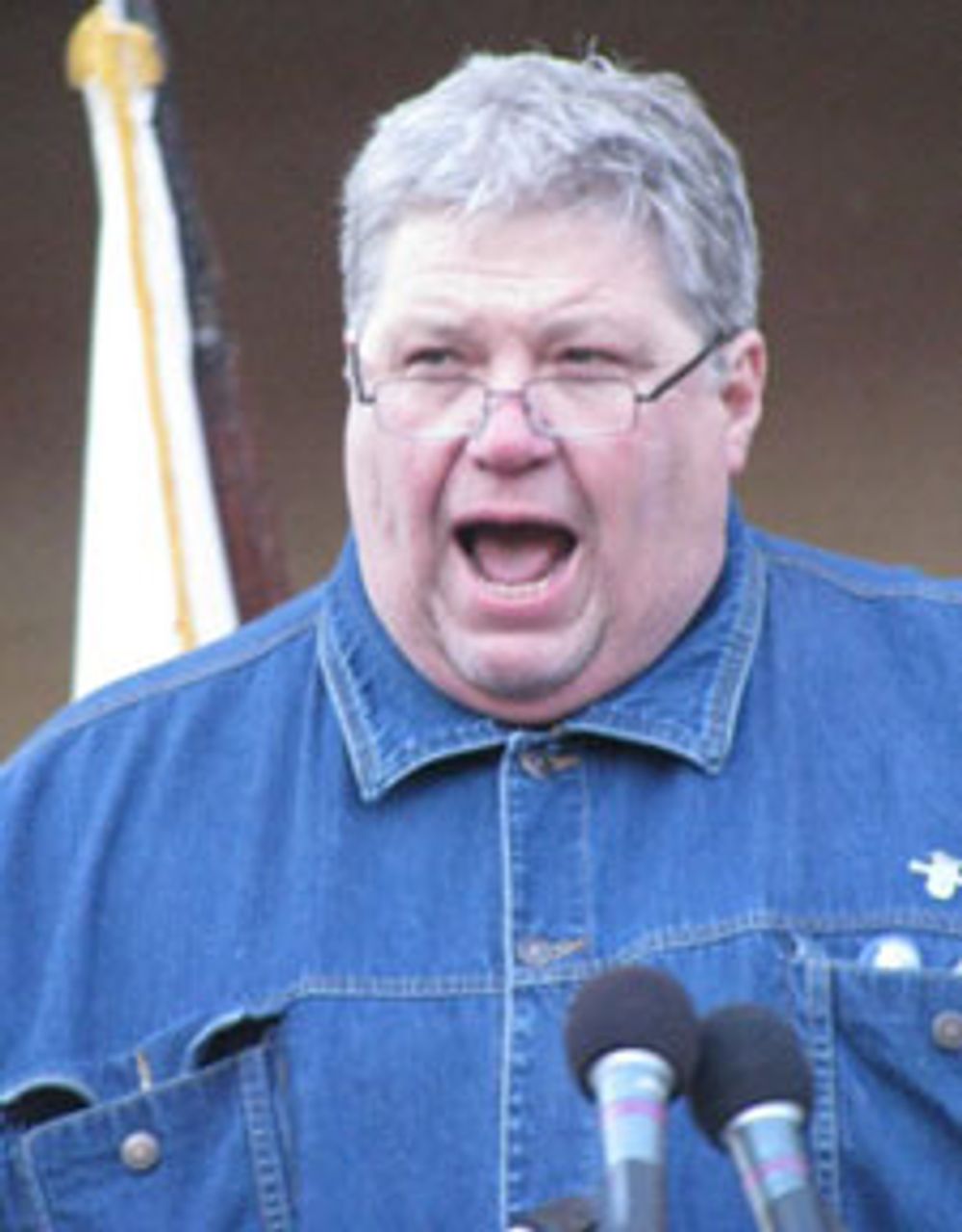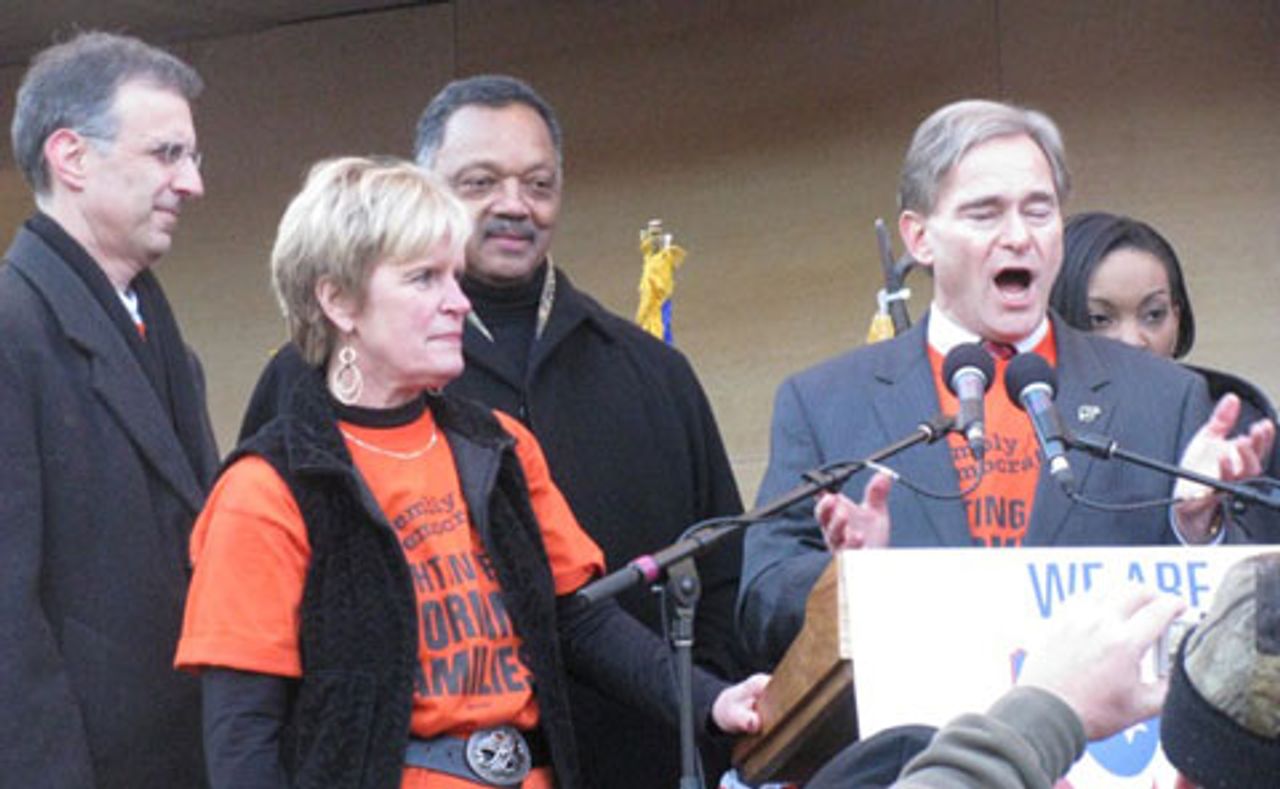The day after Wisconsin Governor Scott Walker rammed through a bill to strip public workers of the right to collectively bargain, union officials and state Democrats sought to contain the eruption of social anger and block any decisive response by the working class.
Top union officials worked deliberately Wednesday evening and all day Thursday to try to quash growing support for a general strike and divert opposition into a toothless campaign for the recall of Republican politicians and the filing of lawsuits.
 Crowd at Thursday night's rally
Crowd at Thursday night's rallySpontaneous demonstrations erupted Wednesday night after Republicans in the Senate used a procedural maneuver to cut benefits and end collective bargaining rights for the vast majority of the state’s 175,000 teachers, nurses and other state and local public employees. Thousands surrounded the state capitol in Madison and occupied the rotunda, with many chanting support for a general strike.
Addressing thousands of protesters at the capitol, supporters of the Socialist Equality Party called for a general strike and explained Walker’s attack on the working class could only be overturned by a unified struggle to force the resignation of his entire administration. (See, "Socialist Equality Party members call for general strike at Wisconsin demonstration".)
While the bill undermines the institutional interests of the labor bureaucracy, it is not primarily aimed at the official unions, which, in any case, have pledged to work with Walker to slash public employees’ pay and gut social spending. With its ban on “strikes, work stoppages, sit-downs, stay-ins, slowdowns, or other concerted activities”―among other things, the bill is aimed at criminalizing any form of organized working class resistance.
As workers expressed their determination to fight this provocation, union officials immediately urged calm and sought to block any action to stop the vote on the bill by the Republican-controlled state Assembly on Thursday. In a press conference Wednesday night, Mary Bell, the president of the 98,000-member Wisconsin Education Association Council, implored teachers “to be at work tomorrow as we determine the next step to have the voices of Wisconsin’s workers to be heard.”
This “next step” was outlined by Marty Beil, the president of the Wisconsin Public Employees Union, who called for “peaceful demonstrations” and said the only recourse workers had was to “change the face of the government” by campaigning to recall eight Republican state senators and elect Democrats.
More than 1,000 Madison middle and high school students walked out of class Thursday―effectively shutting down the schools in support of their teachers―to join protests at the capitol against the Assembly vote. The walkout, which included about 600 students from East High School and another 800 West High School students, erupted outside of the control of the unions and was reportedly organized through posters at the school and on Facebook. Students pledged to walk out again Friday.
“People are really upset that the Republican senators passed this bill illegally...We feel like it's a slap in the face,” one student, interviewed by the Wisconsin State Journal, said. Hamilton eighth-grader Jack Becker spoke to a crowd of hundreds of protesters outside the capitol. “I want to be part of stopping this," he said, adding that the students at the rally were excused from class by their parents.
 Wisconsin AFL-CIO leader Phil Neuenfeldt
Wisconsin AFL-CIO leader Phil NeuenfeldtHours after the Assembly voted for the bill, the Wisconsin AFL-CIO and the Democrats organized a rally outside the capitol involving around 2,000 people. While condemning the “trampling on democratic rights,” union officials complained that Walker was never interested in working with them to reduce the budget deficit―given the fact they had already agreed to impose $330 million in wage and benefit concessions on their members―but only in “grabbing power.”
“None of these provisions had anything to do with the budget,” said Phil Neuenfeldt, president of the Wisconsin AFL-CIO. He lamented that the governor’s action had “shed 50 years of labor peace, bipartisanship and the democratic process.”
Neuenfeldt's remarks about “labor peace” refers to the unions’ role in suppressing the class struggle. By dispensing with the unions, Neuenfeldt implied, the governor and the corporate interests behind him were unleashing a movement of working class opposition that the unions could not contain.
 State Democrats with representative Peter Barca speaking
State Democrats with representative Peter Barca speakingAlso speaking was Peter Barca, a Democratic state representative, who was hailed by union officials along with other state Democrats for supposedly standing up to Walker. In fact, the Democrats were frantically seeking a “compromise” with Walker that would allow the passage of all of the key elements of the bill. Moreover, the state Democrats repeatedly boasted they made the deepest cuts in Wisconsin’s history―with the support of the unions―during the eight-year term of Walker’s Democratic predecessor, Governor Jim Doyle.
In an effort to dissuade workers from taking any serious action against Walker, Barca urged them to take the “moral high ground” and “channel it into the ballot boxes.” The “fire in the eyes” of the workers, he said, should be used to get out the vote on April 5 for the Democrats.
Next was professional charlatan Jesse Jackson, who has made a career of propping up the labor bureaucracy and diverting social anger into the dead-end of the Democratic Party. Jackson invoked the memory of the civil rights movement, noting that next month was the anniversary of the April 4, 1968 assassination of Martin Luther King Jr. who was murdered while defending the right of Memphis sanitation workers to organize. He suggested that workers―in order to “honor the legacy” of King―should go out on April 5 to vote for the Democrats.
In a march around the capitol after the speeches, workers enthusiastically took leaflets from supporters of the Socialist Equality Party advocating a general strike to force Walker’s resignation. Several asked how a general strike could be organized, and SEP supporters explained that rank-and-file committees should be elected in every workplace to make preparations for such an action, which would have to take the form of a rebellion against the official unions.
One public worker, a member of the Teamsters union, said, “I agree with a general strike. I don’t think a recall, which could take months, if not years, is going to do anything. We have to stop this.”
